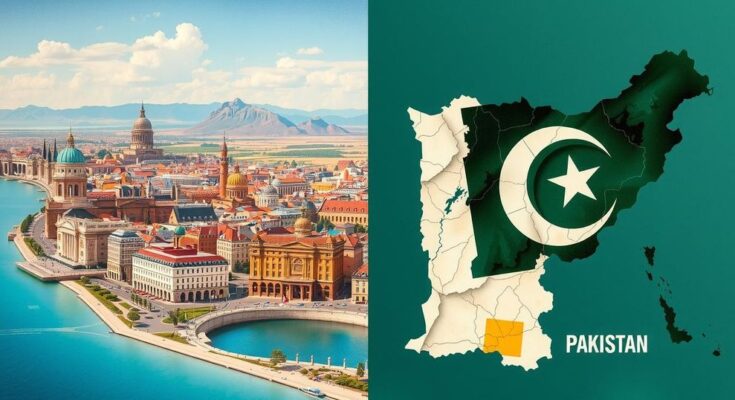Javier Milei’s presidency in Argentina has led to a dramatic economic turnaround, reducing inflation from over 200% to single digits through significant government reforms. His strategies resonate with some in Pakistan, who seek similar leadership to address their ongoing economic issues. However, Milei’s controversial views on foreign policy and economic history raise concerns about adopting his model without critical scrutiny.
Argentina has experienced a significant transformation under President Javier Milei, who has been likened to a potential figure for Pakistan, where economic distress persists. Originally a distinguished economy in South America, Argentina has faced recurring financial crises, necessitating intervention from international monetary institutions like the IMF. Since his election, Milei has implemented reforms that drastically reduced inflation from over 200% to single digits, drawing interest from Pakistani observers who hope for similar change in their own country.
Milei’s economic strategy, which includes severe cuts to government size and deregulation, has garnered global attention. His insights in a podcast delve into these changes, suggesting that slashing governmental bureaucracy and eliminating fiscal deficits were crucial moves. He rightly identifies the merits of reduced inflation and the elimination of price controls to protect consumer purchasing power, a point that resonates with the challenges faced by Pakistan. Furthermore, he criticizes the detrimental effects of taxpayer-funded projects leading to corruption, a concern that parallels issues in Pakistan.
However, Milei’s controversial opinions, particularly regarding foreign policy and historical perspectives, present serious reservations. He has been criticized for his overt support of the US and Israel, contrasting his professed commitment to freedom. His historical views, which overlook significant economic progress in Muslim empires and romanticize the Industrial Revolution, display a potentially flawed understanding of economic history. Moreover, his interpretations of classical economists, including Milton Friedman, reveal misunderstandings that further cloud his economic propositions.
Despite the valid critiques of his narrative, the pursuit of a knowledgeable leader capable of challenging Pakistan’s entrenched bureaucratic systems is necessary. Enhanced economic freedom could benefit the populace, yet it is essential to avoid adopting problematic ideologies or biases that may accompany such approaches. Policymakers should strive for a balanced understanding to catalyze genuine reform while ensuring respect for historical accuracy and fair economic principles.
The article discusses Argentina’s recent economic turnaround under President Javier Milei, comparing it to the economic struggles of Pakistan. Argentina, once a flourishing economy, has faced significant challenges, including high inflation and repeated IMF interventions. Following his election, Milei has implemented various reforms aimed at reducing government size and deregulating the economy, leading to lowered inflation rates—a situation observers in Pakistan find appealing amid their own economic malaise. The text assesses Milei’s strategies while critiquing some of his controversial views, emphasizing the need for prudence in adopting similar approaches in Pakistan.
While Javier Milei’s tenure has resulted in significant economic improvements for Argentina, his mixed opinions on foreign policy and historical interpretations warrant caution. Pakistan stands at a crossroads, needing economic reform and leadership capable of dismantling convoluted regulations. Yet, it is imperative that new leadership avoids the pitfalls of dogmatic adherence to contentious ideologies or simplistic narratives regarding economics and history. Therefore, the ideal figure for Pakistan would combine practical economic savvy with a nuanced appreciation of its complex historical and societal landscape.
Original Source: www.dawn.com




